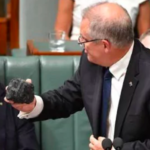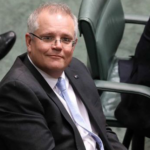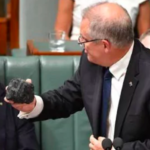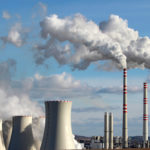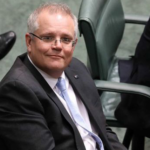Pandemic or Not, the Morrison Squad Represents the Corporates
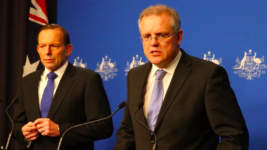
The current COVID-19 pandemic overshadowed the revelations around the Australian government’s dodgy dealings with Timor-Leste that Bernard Collaery set out in his recently published foreign policy history, Oil Under Troubled Water.
A key issue raised in the book is that when then Australian foreign minister Alexander Downer signed a 2006 Timor Gap oil and gas treaty with the newly independent nation, our government managed to hide that it had located very lucrative helium reserves in the gas fields.
The barrister further pointed out that as the Howard government did this to benefit US corporation ConocoPhillips, it was not only detrimental to the East Timorese, but Australians as well. And this leaves the reader struck by the fact that things haven’t changed much.
Right before the coronavirus outbreak, the bushfire crisis swept through the country. And as the initial shock around the PM’s inadequate response began to wear off, Australians started wising up to the fact that the Coalition isn’t necessarily working in the public’s best interests.
So, while we’re all very much thankful that the COVID-19 outbreak is being contained, the assertions that the government’s response is somehow birthing a socialist society are far from the truth, as rather it’s tiding us over for more of its corporate-focused politicking on the other side.
The Hawaii 5-0 PM
As the COVID-19 crisis was kicking in, renowned political commentator Noam Chomsky told Sydney Criminal Lawyers that he considers “Morrison’s Australia” to be one of the top three climate criminals due to its continued reliance on “the most dangerous of fossil fuels”, that being coal.
This claim was made right after the unprecedented bushfires, which are widely accepted to be climate-related. And Chomsky’s contention is further supported by the PM stating at the beginning of the crisis that “we’re not interested in closing down the mining industry but building it up”.
Morrison made this statement in November at a Queensland Resources Council luncheon, where he also spruiked a proposal for new laws that would see secondary boycotts of fossil fuel projects outlawed.
The prime minister had already made certain that he’s on the climate change deniers team, when, as treasurer, he waltzed into the House of Representatives sporting a lump of coal, assuring the MPs gathered that there was no reason to be afraid of its impacts.
And while the “liar from the Shire” was all about the theatrics on that February 2017 day, the actual scope of his buffoonery not only had implications for the over 7 billion people on the planet right now, but it also factors into whether future generations will even exist.
The neoliberal agenda
At the beginning of the month, as responses to COVID-19 were still emerging, British social commentator George Monbiot remarked that faced with the pandemic “the worst possible leaders are in charge at the worst possible time”. And he citied Trump, Johnson and Morrison.
Monbiot elaborated that these three heads of state were failing in their responses to the virus as their nations’ governments have been waging a 50 year campaign to destroy public health and environmental protection, so as to “ensure that the dirtiest companies get their way”.
And his insistence that our government is prioritising the interests of corporates over taxpayers is underscored by Greenpeace’s 2019 Dirty Power documentary, which reveals that the Morrison government is stacked with representatives from the fossil fuel industry.
Business as usual
Despite the bizarre assertions that Morrison and his cronies have somehow turned socialist during the pandemic, nothing is further than the truth. Indeed, the government’s first two economic stimulus packages were heavily weighted towards corporations.
And by the time the Liberal Nationals got around to covering workers, they made certain the JobKeeper payouts are funnelled through employers, as well as that these subsidies leave 2.2 million casual employees out in the cold.
A government that was serious about containing the spread of the virus wouldn’t have left over 1 million temporary visa holders in the lurch without a safety net. And nor would it neglect to do something about the crises in waiting that are prisoner populations and immigration detainees.
Industrial attacks
Then there’s certain other measures that the Coalition is rolling out that definitely indicate the PM has not been consulting Mao’s little red book. Just last week, industrial relations minister Christian Porter brought about a dramatic change to workers’ rights.
Announced on 16 April, a new regulation cuts the time employers need to notify workers and unions about any changes to pay, penalty rates, leave entitlements and working hours down from seven days to just 24 hours.
While the government has assured that this new rule will expire in six months’ time, critics of the move are concerned that ministers are simply taking the opportunity that the pandemic affords them to undermine the bargaining power of workers in favour of corporations.
And in a further display of who the Liberal Nationals government is prioritising at present, treasurer Josh Frydenberg announced on Wednesday that the nation’s company tax rate of 30 percent is too high, and he wants to see it slashed.
System change
Whether we consider the government’s focus on profit as a pathway out of the pandemic, its avowed commitment to the fossil fuel industry or we cast our minds back to the East Timor rip off, it’s clear that our leaders represent corporate interests first.
Despite recent crises pointing to major issues around our economy’s over reliance on a casualised workforce, a lack of prioritisation of public health, and our nation’s dependence upon industries that are destroying the planet, the Morrison government is not moving to address this.
If a water shortage crisis followed by a bushfire catastrophe, leading onto a public health emergency requiring the whole nation to stay indoors isn’t enough to wake those in power up to the very real need for a change in the way we do things, then it’s rather scary to contemplate what would.
And as we hover upon this very narrow precipice, we should consider that our leaders are actually supposed to be working for us.


